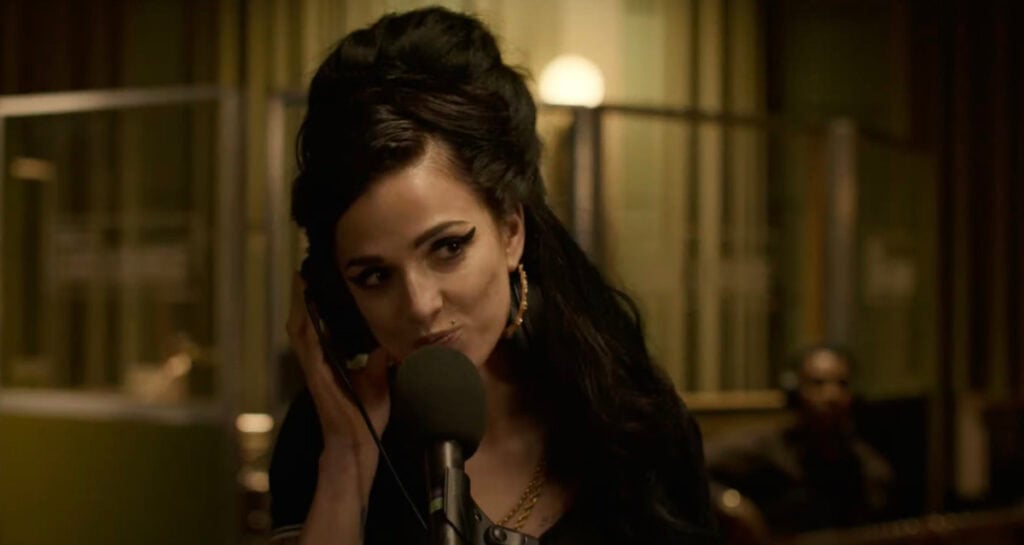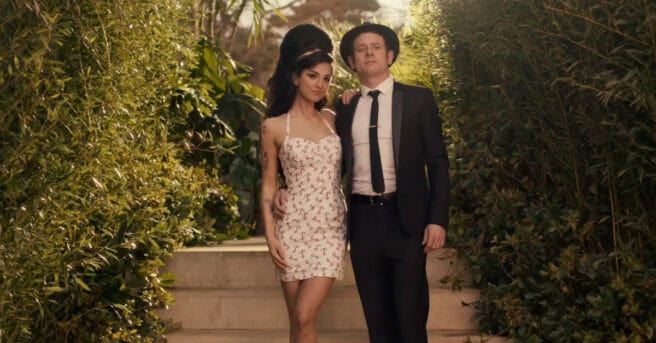

PLOT: The life of singer Amy Winehouse (Marisa Abela), including her troubled relationship with her ex-husband Blake Fielder-Civil (Jack O’Connell) and father (Eddie Marsan) and her struggles with addiction.
REVIEW: When making a biopic about a famously troubled yet brilliant artist, there’s a fine line to walk when it comes to juggling the story of their art with the depiction of their addictions. Movies like Rocket Man or Walk the Line did it well, but they told ultimately triumphant stories about people overcoming those addictions. When the person succumbs, it can be dicier. I remember the Whitney Houston biopic, I Wanna Dance With Somebody, tried to do both but spent way too much time with its star miming along to Houston songs. Bohemian Rhapsody turned Freddie Mercury’s life into a PG-13 cartoon.
Back to Black, Sam Taylor-Johnson’s Amy Winehouse movie struggles to find a solid middle ground, but it can’t get over the fact that the story was told much more effectively in Asif Kapadia’s Amy, which remains definitive.
Part of the reason Back to Black feels half-baked is due to a common issue plaguing these movies. When the rights to a musician’s work are controlled by an estate of their former family members, a narrative must be followed. In this case, the frayed relationship between Amy and her father, Mitch (played by Eddie Marsan), is depicted as much more sympathetic than the documentary ever did. It’s not for me, a viewer, to say what happened or not, but I couldn’t help but feel Amy Winehouse wound up somewhat shafted by her own film, which expertly conveys how troubled she was but falls short of illustrating her brilliance as an artist.
That said, Taylor-Johnson likely made the best film she could under the circumstances. The biggest problem is that Winehouse feels like a supporting character in her own film. That’s not to say Marisa Abela, who does a solid job in the lead, doesn’t get enough screen time. She’s in almost every frame. It’s just that it feels like we’re never seeing events through her eyes but rather those of the people around her.

While Abela is getting good reviews, this is a challenging role for anyone to pull off. She doesn’t look like Winehouse and is more convincing during the musical moments (where she does her own singing) than in some of the more personal bits, where she struggles to pull off the singer’s combative, troubled side without it seeming like a caricature. It’s a tough assignment, to be sure. Jack O’Connell’s performance as Blake Fielder-Civil succeeds mainly on the merits of his own innate charisma. The movie only really comes to life when he’s on screen, such as his charged first meeting with Winehouse, when he pretends not to know who she is and dazzles her with a mimed performance of The Shangr-La’s. Still, the relationship between the two feels hollow, given how potent an effect it had on the singer. Eddie Marsan plays Amy’s father, Mitch, as ultimately well-meaning, if naive to the extent of the singer’s troubles, which seems to be the company line. The movie has us sympathize with his decision not to force her trip to rehab, as documented in her most famous song.
Perhaps, if Kapadia’s documentary didn’t exist, Back to Black would be seen as a more insightful journey into Winehouse’s life, but as it is, the film can’t help but feel like just another biopic. Maybe part of it is that Winehouse’s death in 2011 is still fresh in the minds of many, with many of her fans having definite opinions on who’s to blame. The movie doesn’t take a stand in that regard, which is commendable. As outsiders, we don’t know what the truth of the matter is. But it can’t be denied that the biopic ultimately feels forgettable and doesn’t really do a good job of paying tribute to Winehouse’s lasting legacy. The movie is eminently fair to the people around her, but the singer feels a bit shortchanged in the end.
The post Back to Black Review appeared first on JoBlo.

Leave a Reply